Case Study: R. (on the application of Pretty) v DPP [2001] UKHL 61
VerifiedAdded on 2023/01/05
|7
|1669
|32
Case Study
AI Summary
This case study analyzes the case of R. (on the application of Pretty) v DPP [2001] UKHL 61, focusing on the appellant, Mrs. Diane Pretty, who suffered from a terminal illness and sought assistance in ending her life. The analysis outlines the material facts, including Mrs. Pretty's desire to involve her husband, and her claims that the Director of Public Prosecutions' refusal to provide an undertaking violated her human rights under the European Convention. The case study examines the court's decision, which denied Mrs. Pretty's complaint, asserting that while she had the right to refuse medical treatment, she could not seek assistance in ending her life due to the Suicide Act 1961. The court emphasized the right to life and the limitations on intentionally causing death, differentiating between voluntary euthanasia and the existing legal framework. The case study references relevant books, journals, and online resources to support the analysis.
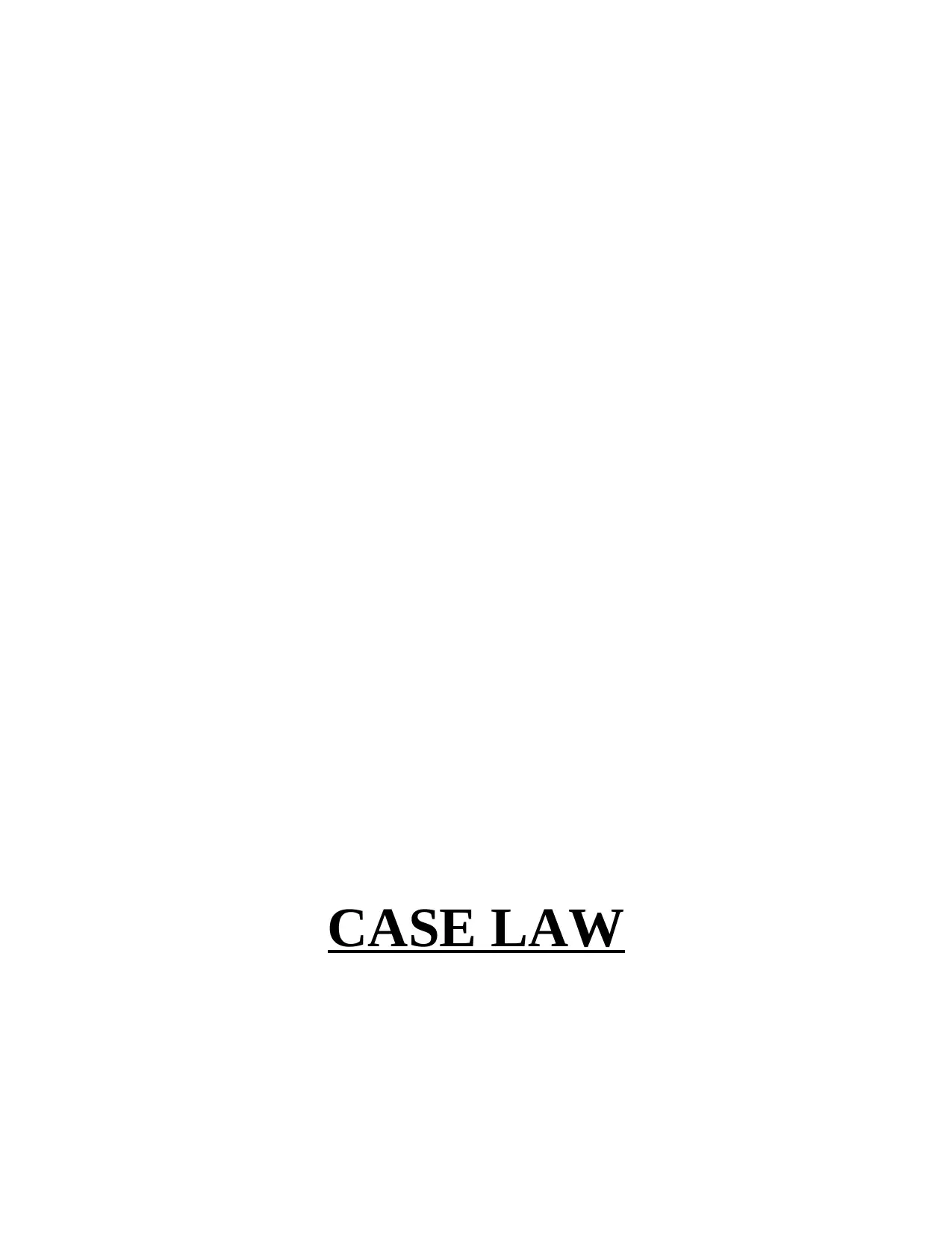
CASE LAW
Paraphrase This Document
Need a fresh take? Get an instant paraphrase of this document with our AI Paraphraser
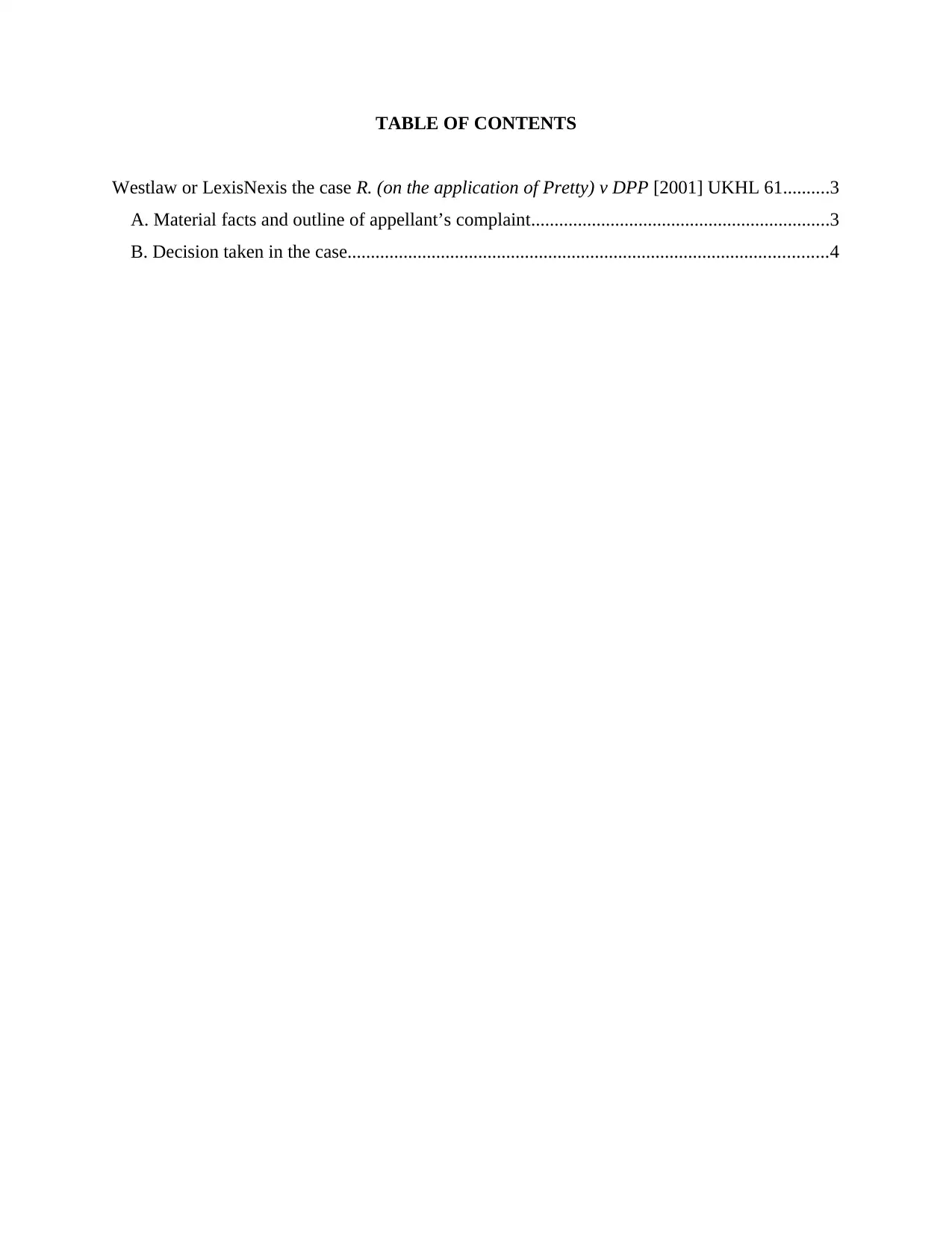
TABLE OF CONTENTS
Westlaw or LexisNexis the case R. (on the application of Pretty) v DPP [2001] UKHL 61..........3
A. Material facts and outline of appellant’s complaint................................................................3
B. Decision taken in the case.......................................................................................................4
Westlaw or LexisNexis the case R. (on the application of Pretty) v DPP [2001] UKHL 61..........3
A. Material facts and outline of appellant’s complaint................................................................3
B. Decision taken in the case.......................................................................................................4
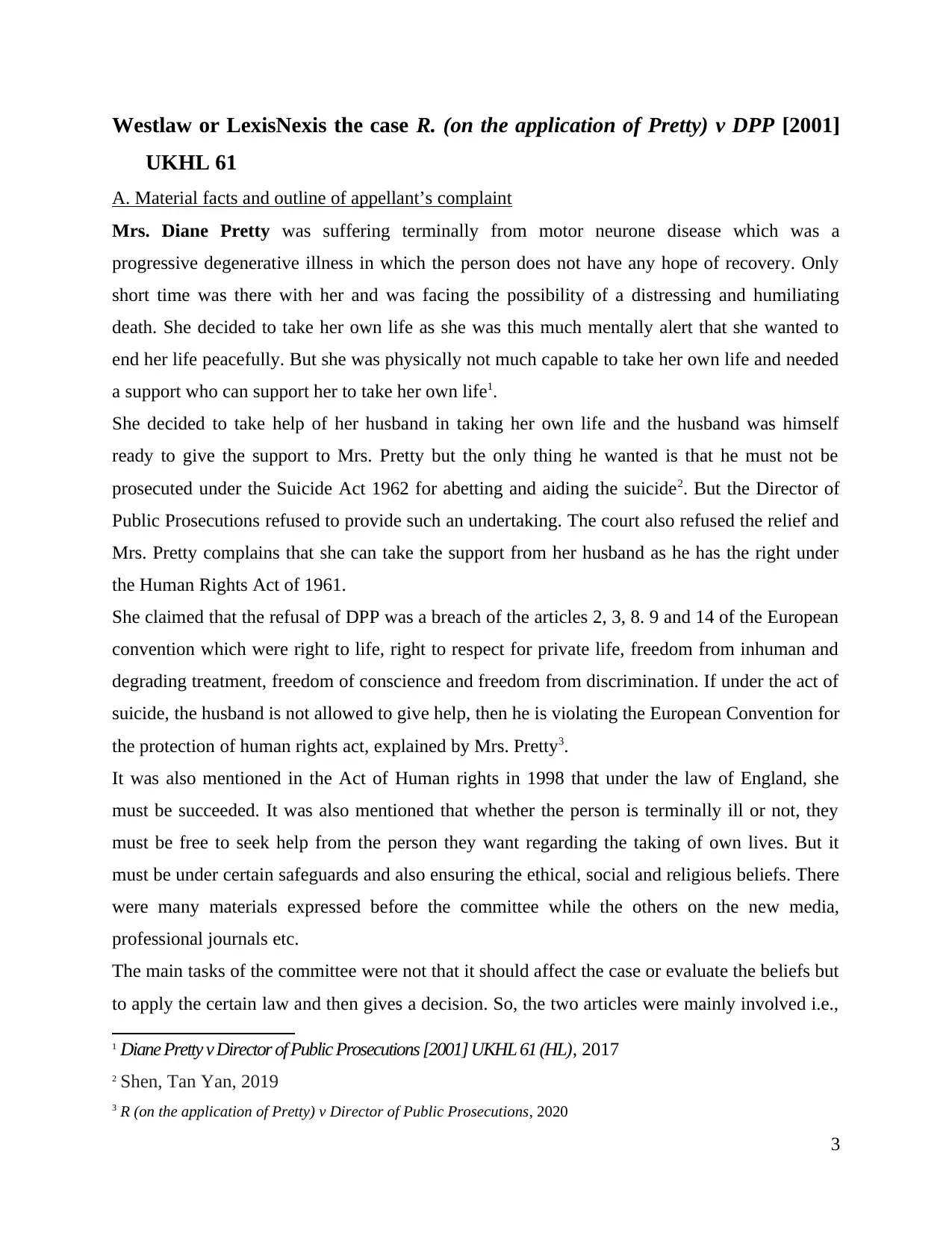
Westlaw or LexisNexis the case R. (on the application of Pretty) v DPP [2001]
UKHL 61
A. Material facts and outline of appellant’s complaint
Mrs. Diane Pretty was suffering terminally from motor neurone disease which was a
progressive degenerative illness in which the person does not have any hope of recovery. Only
short time was there with her and was facing the possibility of a distressing and humiliating
death. She decided to take her own life as she was this much mentally alert that she wanted to
end her life peacefully. But she was physically not much capable to take her own life and needed
a support who can support her to take her own life1.
She decided to take help of her husband in taking her own life and the husband was himself
ready to give the support to Mrs. Pretty but the only thing he wanted is that he must not be
prosecuted under the Suicide Act 1962 for abetting and aiding the suicide2. But the Director of
Public Prosecutions refused to provide such an undertaking. The court also refused the relief and
Mrs. Pretty complains that she can take the support from her husband as he has the right under
the Human Rights Act of 1961.
She claimed that the refusal of DPP was a breach of the articles 2, 3, 8. 9 and 14 of the European
convention which were right to life, right to respect for private life, freedom from inhuman and
degrading treatment, freedom of conscience and freedom from discrimination. If under the act of
suicide, the husband is not allowed to give help, then he is violating the European Convention for
the protection of human rights act, explained by Mrs. Pretty3.
It was also mentioned in the Act of Human rights in 1998 that under the law of England, she
must be succeeded. It was also mentioned that whether the person is terminally ill or not, they
must be free to seek help from the person they want regarding the taking of own lives. But it
must be under certain safeguards and also ensuring the ethical, social and religious beliefs. There
were many materials expressed before the committee while the others on the new media,
professional journals etc.
The main tasks of the committee were not that it should affect the case or evaluate the beliefs but
to apply the certain law and then gives a decision. So, the two articles were mainly involved i.e.,
1 Diane Pretty v Director of Public Prosecutions [2001] UKHL 61 (HL), 2017
2 Shen, Tan Yan, 2019
3 R (on the application of Pretty) v Director of Public Prosecutions, 2020
3
UKHL 61
A. Material facts and outline of appellant’s complaint
Mrs. Diane Pretty was suffering terminally from motor neurone disease which was a
progressive degenerative illness in which the person does not have any hope of recovery. Only
short time was there with her and was facing the possibility of a distressing and humiliating
death. She decided to take her own life as she was this much mentally alert that she wanted to
end her life peacefully. But she was physically not much capable to take her own life and needed
a support who can support her to take her own life1.
She decided to take help of her husband in taking her own life and the husband was himself
ready to give the support to Mrs. Pretty but the only thing he wanted is that he must not be
prosecuted under the Suicide Act 1962 for abetting and aiding the suicide2. But the Director of
Public Prosecutions refused to provide such an undertaking. The court also refused the relief and
Mrs. Pretty complains that she can take the support from her husband as he has the right under
the Human Rights Act of 1961.
She claimed that the refusal of DPP was a breach of the articles 2, 3, 8. 9 and 14 of the European
convention which were right to life, right to respect for private life, freedom from inhuman and
degrading treatment, freedom of conscience and freedom from discrimination. If under the act of
suicide, the husband is not allowed to give help, then he is violating the European Convention for
the protection of human rights act, explained by Mrs. Pretty3.
It was also mentioned in the Act of Human rights in 1998 that under the law of England, she
must be succeeded. It was also mentioned that whether the person is terminally ill or not, they
must be free to seek help from the person they want regarding the taking of own lives. But it
must be under certain safeguards and also ensuring the ethical, social and religious beliefs. There
were many materials expressed before the committee while the others on the new media,
professional journals etc.
The main tasks of the committee were not that it should affect the case or evaluate the beliefs but
to apply the certain law and then gives a decision. So, the two articles were mainly involved i.e.,
1 Diane Pretty v Director of Public Prosecutions [2001] UKHL 61 (HL), 2017
2 Shen, Tan Yan, 2019
3 R (on the application of Pretty) v Director of Public Prosecutions, 2020
3
⊘ This is a preview!⊘
Do you want full access?
Subscribe today to unlock all pages.

Trusted by 1+ million students worldwide
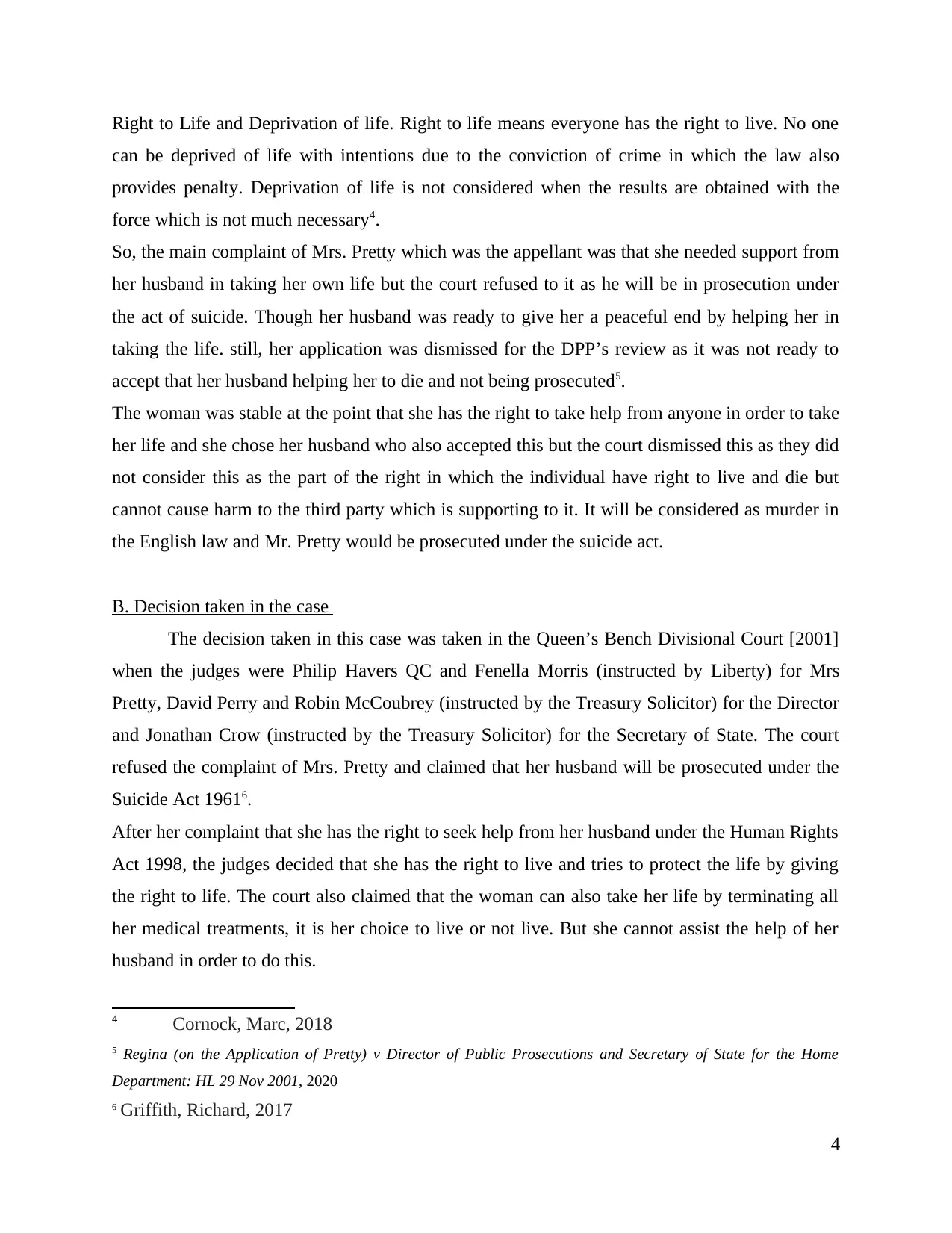
Right to Life and Deprivation of life. Right to life means everyone has the right to live. No one
can be deprived of life with intentions due to the conviction of crime in which the law also
provides penalty. Deprivation of life is not considered when the results are obtained with the
force which is not much necessary4.
So, the main complaint of Mrs. Pretty which was the appellant was that she needed support from
her husband in taking her own life but the court refused to it as he will be in prosecution under
the act of suicide. Though her husband was ready to give her a peaceful end by helping her in
taking the life. still, her application was dismissed for the DPP’s review as it was not ready to
accept that her husband helping her to die and not being prosecuted5.
The woman was stable at the point that she has the right to take help from anyone in order to take
her life and she chose her husband who also accepted this but the court dismissed this as they did
not consider this as the part of the right in which the individual have right to live and die but
cannot cause harm to the third party which is supporting to it. It will be considered as murder in
the English law and Mr. Pretty would be prosecuted under the suicide act.
B. Decision taken in the case
The decision taken in this case was taken in the Queen’s Bench Divisional Court [2001]
when the judges were Philip Havers QC and Fenella Morris (instructed by Liberty) for Mrs
Pretty, David Perry and Robin McCoubrey (instructed by the Treasury Solicitor) for the Director
and Jonathan Crow (instructed by the Treasury Solicitor) for the Secretary of State. The court
refused the complaint of Mrs. Pretty and claimed that her husband will be prosecuted under the
Suicide Act 19616.
After her complaint that she has the right to seek help from her husband under the Human Rights
Act 1998, the judges decided that she has the right to live and tries to protect the life by giving
the right to life. The court also claimed that the woman can also take her life by terminating all
her medical treatments, it is her choice to live or not live. But she cannot assist the help of her
husband in order to do this.
4 Cornock, Marc, 2018
5 Regina (on the Application of Pretty) v Director of Public Prosecutions and Secretary of State for the Home
Department: HL 29 Nov 2001, 2020
6 Griffith, Richard, 2017
4
can be deprived of life with intentions due to the conviction of crime in which the law also
provides penalty. Deprivation of life is not considered when the results are obtained with the
force which is not much necessary4.
So, the main complaint of Mrs. Pretty which was the appellant was that she needed support from
her husband in taking her own life but the court refused to it as he will be in prosecution under
the act of suicide. Though her husband was ready to give her a peaceful end by helping her in
taking the life. still, her application was dismissed for the DPP’s review as it was not ready to
accept that her husband helping her to die and not being prosecuted5.
The woman was stable at the point that she has the right to take help from anyone in order to take
her life and she chose her husband who also accepted this but the court dismissed this as they did
not consider this as the part of the right in which the individual have right to live and die but
cannot cause harm to the third party which is supporting to it. It will be considered as murder in
the English law and Mr. Pretty would be prosecuted under the suicide act.
B. Decision taken in the case
The decision taken in this case was taken in the Queen’s Bench Divisional Court [2001]
when the judges were Philip Havers QC and Fenella Morris (instructed by Liberty) for Mrs
Pretty, David Perry and Robin McCoubrey (instructed by the Treasury Solicitor) for the Director
and Jonathan Crow (instructed by the Treasury Solicitor) for the Secretary of State. The court
refused the complaint of Mrs. Pretty and claimed that her husband will be prosecuted under the
Suicide Act 19616.
After her complaint that she has the right to seek help from her husband under the Human Rights
Act 1998, the judges decided that she has the right to live and tries to protect the life by giving
the right to life. The court also claimed that the woman can also take her life by terminating all
her medical treatments, it is her choice to live or not live. But she cannot assist the help of her
husband in order to do this.
4 Cornock, Marc, 2018
5 Regina (on the Application of Pretty) v Director of Public Prosecutions and Secretary of State for the Home
Department: HL 29 Nov 2001, 2020
6 Griffith, Richard, 2017
4
Paraphrase This Document
Need a fresh take? Get an instant paraphrase of this document with our AI Paraphraser
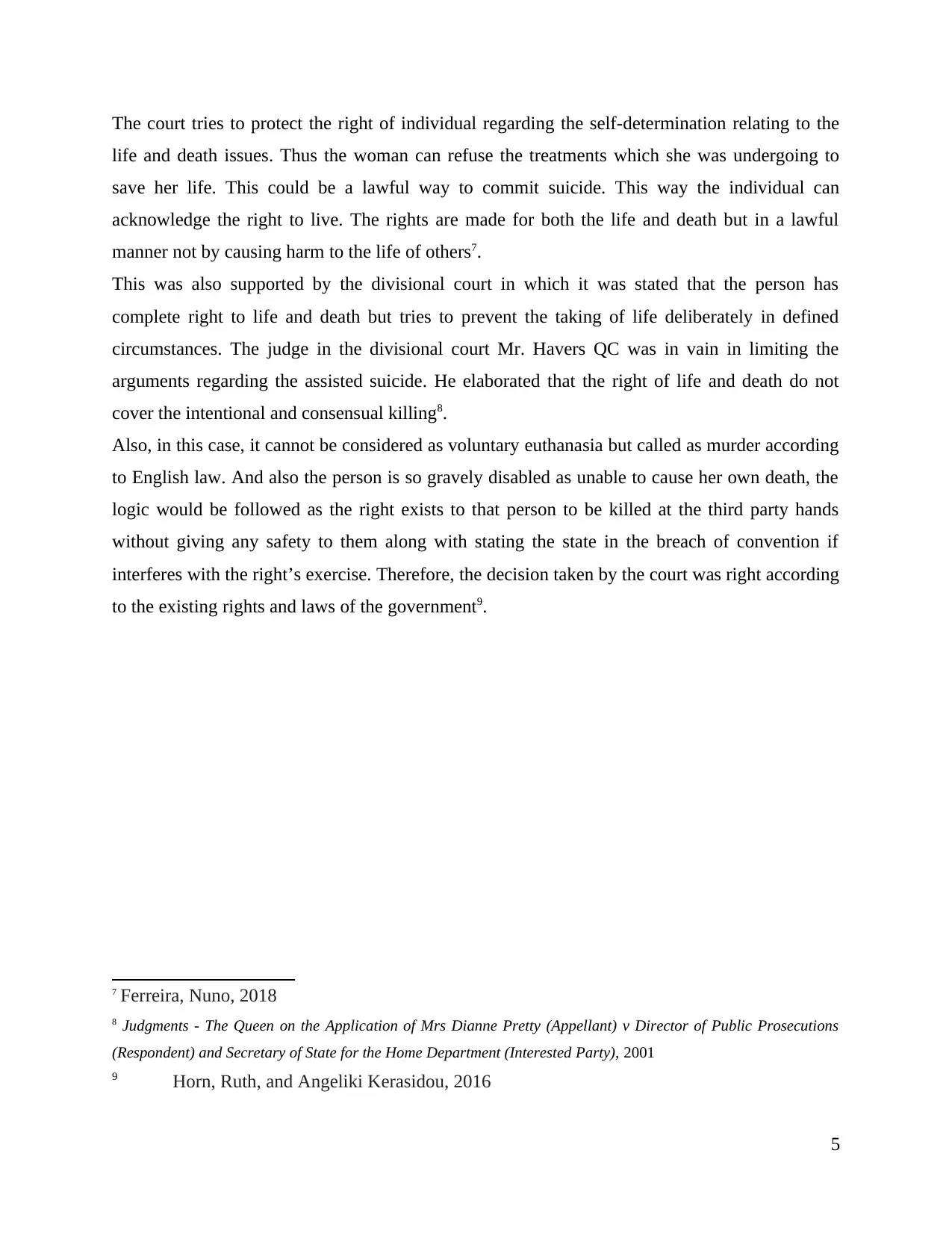
The court tries to protect the right of individual regarding the self-determination relating to the
life and death issues. Thus the woman can refuse the treatments which she was undergoing to
save her life. This could be a lawful way to commit suicide. This way the individual can
acknowledge the right to live. The rights are made for both the life and death but in a lawful
manner not by causing harm to the life of others7.
This was also supported by the divisional court in which it was stated that the person has
complete right to life and death but tries to prevent the taking of life deliberately in defined
circumstances. The judge in the divisional court Mr. Havers QC was in vain in limiting the
arguments regarding the assisted suicide. He elaborated that the right of life and death do not
cover the intentional and consensual killing8.
Also, in this case, it cannot be considered as voluntary euthanasia but called as murder according
to English law. And also the person is so gravely disabled as unable to cause her own death, the
logic would be followed as the right exists to that person to be killed at the third party hands
without giving any safety to them along with stating the state in the breach of convention if
interferes with the right’s exercise. Therefore, the decision taken by the court was right according
to the existing rights and laws of the government9.
7 Ferreira, Nuno, 2018
8 Judgments - The Queen on the Application of Mrs Dianne Pretty (Appellant) v Director of Public Prosecutions
(Respondent) and Secretary of State for the Home Department (Interested Party), 2001
9 Horn, Ruth, and Angeliki Kerasidou, 2016
5
life and death issues. Thus the woman can refuse the treatments which she was undergoing to
save her life. This could be a lawful way to commit suicide. This way the individual can
acknowledge the right to live. The rights are made for both the life and death but in a lawful
manner not by causing harm to the life of others7.
This was also supported by the divisional court in which it was stated that the person has
complete right to life and death but tries to prevent the taking of life deliberately in defined
circumstances. The judge in the divisional court Mr. Havers QC was in vain in limiting the
arguments regarding the assisted suicide. He elaborated that the right of life and death do not
cover the intentional and consensual killing8.
Also, in this case, it cannot be considered as voluntary euthanasia but called as murder according
to English law. And also the person is so gravely disabled as unable to cause her own death, the
logic would be followed as the right exists to that person to be killed at the third party hands
without giving any safety to them along with stating the state in the breach of convention if
interferes with the right’s exercise. Therefore, the decision taken by the court was right according
to the existing rights and laws of the government9.
7 Ferreira, Nuno, 2018
8 Judgments - The Queen on the Application of Mrs Dianne Pretty (Appellant) v Director of Public Prosecutions
(Respondent) and Secretary of State for the Home Department (Interested Party), 2001
9 Horn, Ruth, and Angeliki Kerasidou, 2016
5
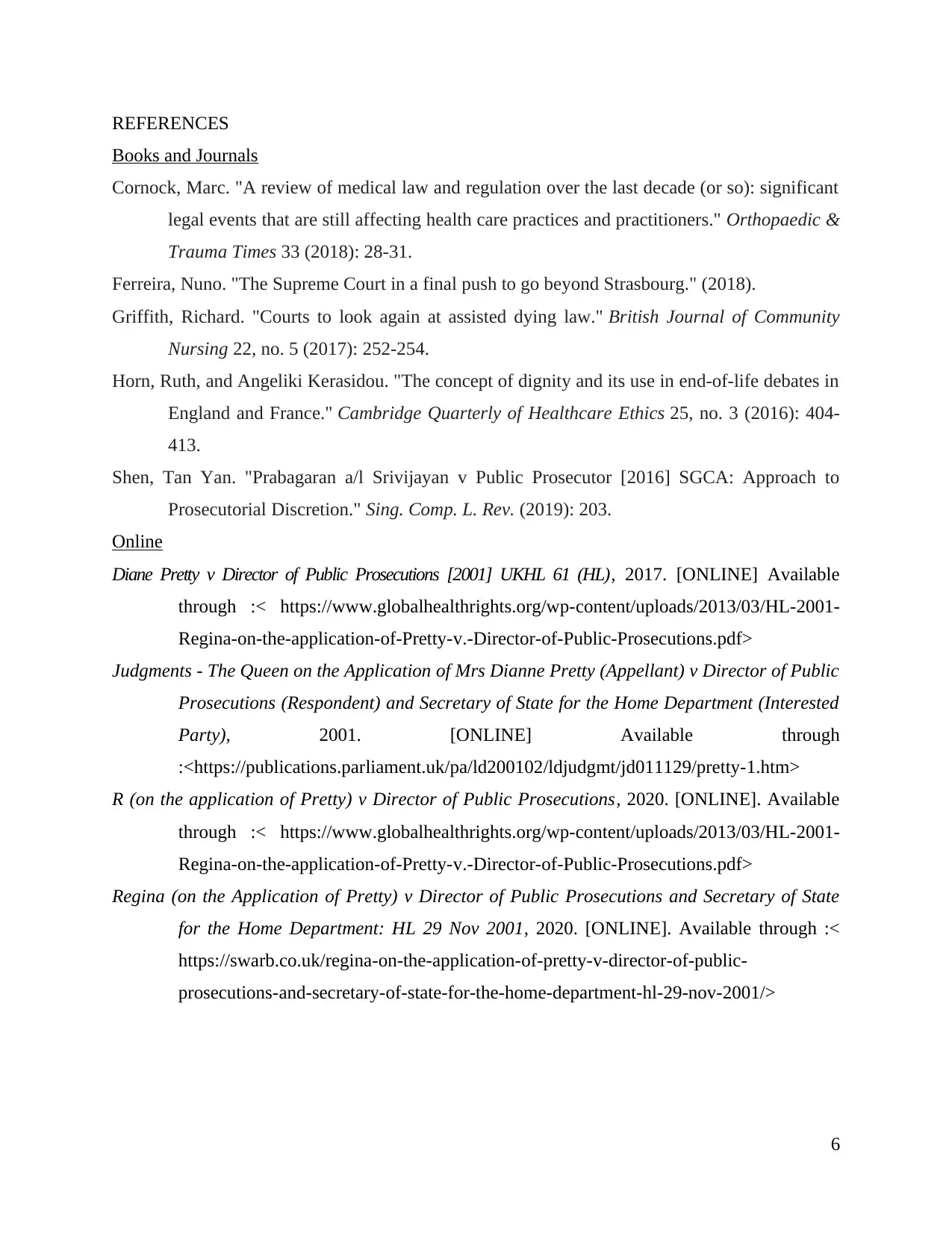
REFERENCES
Books and Journals
Cornock, Marc. "A review of medical law and regulation over the last decade (or so): significant
legal events that are still affecting health care practices and practitioners." Orthopaedic &
Trauma Times 33 (2018): 28-31.
Ferreira, Nuno. "The Supreme Court in a final push to go beyond Strasbourg." (2018).
Griffith, Richard. "Courts to look again at assisted dying law." British Journal of Community
Nursing 22, no. 5 (2017): 252-254.
Horn, Ruth, and Angeliki Kerasidou. "The concept of dignity and its use in end-of-life debates in
England and France." Cambridge Quarterly of Healthcare Ethics 25, no. 3 (2016): 404-
413.
Shen, Tan Yan. "Prabagaran a/l Srivijayan v Public Prosecutor [2016] SGCA: Approach to
Prosecutorial Discretion." Sing. Comp. L. Rev. (2019): 203.
Online
Diane Pretty v Director of Public Prosecutions [2001] UKHL 61 (HL), 2017. [ONLINE] Available
through :< https://www.globalhealthrights.org/wp-content/uploads/2013/03/HL-2001-
Regina-on-the-application-of-Pretty-v.-Director-of-Public-Prosecutions.pdf>
Judgments - The Queen on the Application of Mrs Dianne Pretty (Appellant) v Director of Public
Prosecutions (Respondent) and Secretary of State for the Home Department (Interested
Party), 2001. [ONLINE] Available through
:<https://publications.parliament.uk/pa/ld200102/ldjudgmt/jd011129/pretty-1.htm>
R (on the application of Pretty) v Director of Public Prosecutions, 2020. [ONLINE]. Available
through :< https://www.globalhealthrights.org/wp-content/uploads/2013/03/HL-2001-
Regina-on-the-application-of-Pretty-v.-Director-of-Public-Prosecutions.pdf>
Regina (on the Application of Pretty) v Director of Public Prosecutions and Secretary of State
for the Home Department: HL 29 Nov 2001, 2020. [ONLINE]. Available through :<
https://swarb.co.uk/regina-on-the-application-of-pretty-v-director-of-public-
prosecutions-and-secretary-of-state-for-the-home-department-hl-29-nov-2001/>
6
Books and Journals
Cornock, Marc. "A review of medical law and regulation over the last decade (or so): significant
legal events that are still affecting health care practices and practitioners." Orthopaedic &
Trauma Times 33 (2018): 28-31.
Ferreira, Nuno. "The Supreme Court in a final push to go beyond Strasbourg." (2018).
Griffith, Richard. "Courts to look again at assisted dying law." British Journal of Community
Nursing 22, no. 5 (2017): 252-254.
Horn, Ruth, and Angeliki Kerasidou. "The concept of dignity and its use in end-of-life debates in
England and France." Cambridge Quarterly of Healthcare Ethics 25, no. 3 (2016): 404-
413.
Shen, Tan Yan. "Prabagaran a/l Srivijayan v Public Prosecutor [2016] SGCA: Approach to
Prosecutorial Discretion." Sing. Comp. L. Rev. (2019): 203.
Online
Diane Pretty v Director of Public Prosecutions [2001] UKHL 61 (HL), 2017. [ONLINE] Available
through :< https://www.globalhealthrights.org/wp-content/uploads/2013/03/HL-2001-
Regina-on-the-application-of-Pretty-v.-Director-of-Public-Prosecutions.pdf>
Judgments - The Queen on the Application of Mrs Dianne Pretty (Appellant) v Director of Public
Prosecutions (Respondent) and Secretary of State for the Home Department (Interested
Party), 2001. [ONLINE] Available through
:<https://publications.parliament.uk/pa/ld200102/ldjudgmt/jd011129/pretty-1.htm>
R (on the application of Pretty) v Director of Public Prosecutions, 2020. [ONLINE]. Available
through :< https://www.globalhealthrights.org/wp-content/uploads/2013/03/HL-2001-
Regina-on-the-application-of-Pretty-v.-Director-of-Public-Prosecutions.pdf>
Regina (on the Application of Pretty) v Director of Public Prosecutions and Secretary of State
for the Home Department: HL 29 Nov 2001, 2020. [ONLINE]. Available through :<
https://swarb.co.uk/regina-on-the-application-of-pretty-v-director-of-public-
prosecutions-and-secretary-of-state-for-the-home-department-hl-29-nov-2001/>
6
⊘ This is a preview!⊘
Do you want full access?
Subscribe today to unlock all pages.

Trusted by 1+ million students worldwide

7
1 out of 7
Your All-in-One AI-Powered Toolkit for Academic Success.
+13062052269
info@desklib.com
Available 24*7 on WhatsApp / Email
![[object Object]](/_next/static/media/star-bottom.7253800d.svg)
Unlock your academic potential
Copyright © 2020–2026 A2Z Services. All Rights Reserved. Developed and managed by ZUCOL.

